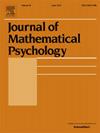Characterizing master fringes in competence-based knowledge space theory for personalized learning applications
IF 1.5
4区 心理学
Q2 MATHEMATICS, INTERDISCIPLINARY APPLICATIONS
引用次数: 0
Abstract
This paper proposes a general method to directly compute the outer (inner) master fringe of the knowledge state based on the top or bottom of the equivalence class of competence state, and a general method for personalized learning guidance (reinforcement learning recommendation) based on competences and the master fringe. Two characterization theorems are mainly given: one characterizes the top (bottom) of competence states using skill functions; the other characterizes the outer (inner) master fringe of knowledge states using problem functions. As applications of two characterization theorems, the first is to provide a new method to directly obtain the corresponding competence state’s top or bottom from the knowledge state. The second application is to integrate skills into the competence-based master fringe, which takes into account the influence of students’ latent competences, resulting in more precise values.
基于能力的知识空间理论在个性化学习中的应用
本文提出了一种基于能力状态等价类的顶或底直接计算知识状态的外(内)主条纹的通用方法,以及一种基于能力和主条纹的个性化学习指导(强化学习推荐)的通用方法。主要给出了两个表征定理:一个是利用技能函数表征能力状态的上(下)层;另一种是利用问题函数表征知识状态的外(内)主边缘。作为两个表征定理的应用,一是提供了一种从知识状态中直接获得相应能力状态的顶或底的新方法。二是将技能融入到以能力为基础的master fringe中,考虑到学生潜在能力的影响,得到更精确的数值。
本文章由计算机程序翻译,如有差异,请以英文原文为准。
求助全文
约1分钟内获得全文
求助全文
来源期刊

Journal of Mathematical Psychology
医学-数学跨学科应用
CiteScore
3.70
自引率
11.10%
发文量
37
审稿时长
20.2 weeks
期刊介绍:
The Journal of Mathematical Psychology includes articles, monographs and reviews, notes and commentaries, and book reviews in all areas of mathematical psychology. Empirical and theoretical contributions are equally welcome.
Areas of special interest include, but are not limited to, fundamental measurement and psychological process models, such as those based upon neural network or information processing concepts. A partial listing of substantive areas covered include sensation and perception, psychophysics, learning and memory, problem solving, judgment and decision-making, and motivation.
The Journal of Mathematical Psychology is affiliated with the Society for Mathematical Psychology.
Research Areas include:
• Models for sensation and perception, learning, memory and thinking
• Fundamental measurement and scaling
• Decision making
• Neural modeling and networks
• Psychophysics and signal detection
• Neuropsychological theories
• Psycholinguistics
• Motivational dynamics
• Animal behavior
• Psychometric theory
 求助内容:
求助内容: 应助结果提醒方式:
应助结果提醒方式:


